The article will reveal all the riddles that coffee conceals, will answer the questions, what is the harm and benefit of coffee, how to store coffee, what are the differences between Arabica and robusta, what kind of coffee to prefer, and many others.
Contents
- How does coffee affect the human body?
- Coffee damage
- Benefit from drinking coffee
- Daily coffee consumption rate
- Coffee types and varieties: Arabica and robusta
- What kind of coffee does coffee grind?
- How much can you store ground coffee?
- Most popular coffee drinks
- Is it useful or harmful to have coffee with milk?
- Is it useful or harmful coffee with lemon?
- Is it useful or harmful to have coffee with cinnamon?
- Is decaffeinated coffee good or bad?
- How to prepare coffee?
- Useful tips for the hostess
- Video: Coffee. Harmful and useful
- Video: Scientific news about the benefits of coffee
Drink, without which many no longer represent their lives, coffee has not only firmly entered the diet, but has become an integral part of social conversations and business meetings, as well as a means to charge vivacity,mood enhancement and rescue for people with low blood pressure.
Nevertheless, from time to time you can hear about the results of the next study with new facts of harm or use of coffee. Should I give up this familiar drink, or is it completely harmless? In order to make an informed decision, it is necessary to know all the pros and cons of coffee.
How does coffee affect the human body?
The effect that coffee exerts on the human body is made up of the actions of its individual components. Therefore, first you should look into the chemical composition of this drink.
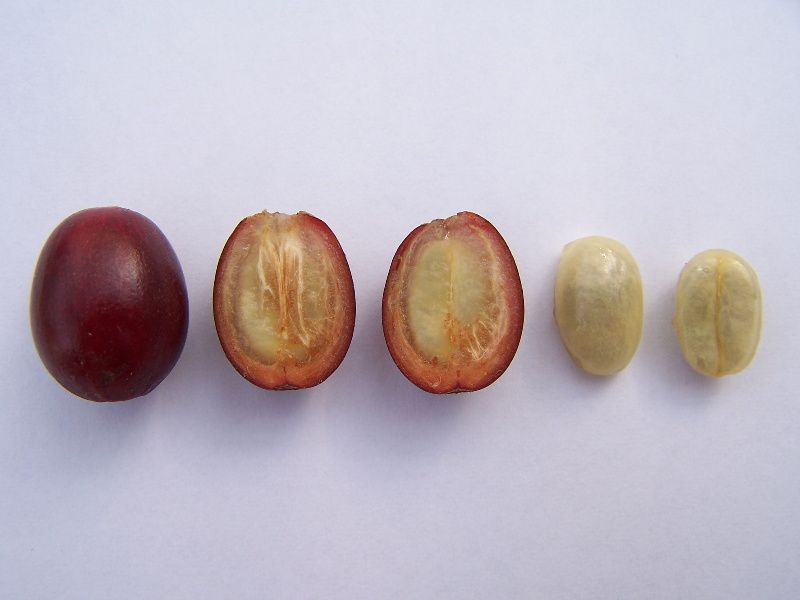 raw coffee beans
raw coffee beans Raw coffee beans contain:
- proteins, fats and carbohydrates
- alkaloids( trigonellin and caffeine)
- acids( chlorogenic, cinnamon, citric, coffee, oxalic, etc.)
- tannins
- mineral salts and trace elements( potassium, phosphorus, calcium, iron, nitrogen, etc.)
- vitamins
- essential oils
- water
When roasting, the proportions of the elements contained in the grain change, new compounds( for example, PP vitamins) are formed. Depending on the type of coffee beans and the degree of their roasting, the composition of the drink is also different.
- Caffeine
Known for its excitatory properties of the nervous system, increased productivity, energy, reduced physical fatigue and drowsiness. Also, caffeine is accused of addiction and addiction.
IMPORTANT: Caffeine is found in many plants, but in large quantities - in guarana, in tea leaves, coffee beans, cocoa and cola nuts.
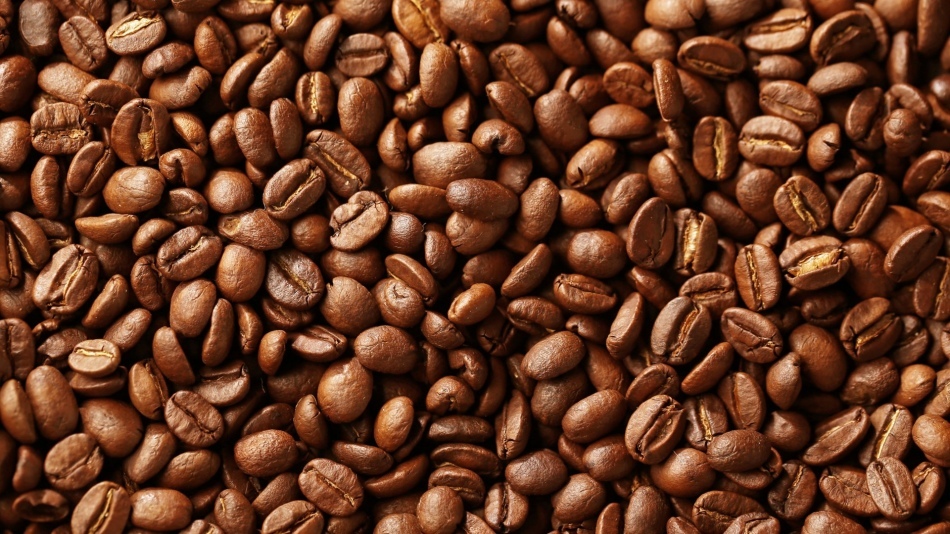 coffee beans
coffee beans - Trigonellin
Trigonellin is involved in the process of roasting grains in the formation of a multicomponent substance caffeol, which gives the coffee its characteristic flavor and aroma. In addition, during frying, trigonellin secretes nicotinic acid( vitamin PP or B3), which improves microcirculation, lowers cholesterol, etc.
IMPORTANT: Lack of vitamin PP can lead to the development of pellagra( symptoms: diarrhea, mental dysfunction, dermatitis).
- Chlorogenic acid
Present in the composition of different plants, but coffee has the highest concentration of this acid. The beneficial properties of chlorogenic acid include improving the exchange of nitrogen. In addition, the acids contained in the coffee contribute to the normalization of the digestive tract. Chlorogenic acid brings an astringent taste to coffee.
- Vitamin R
Strengthens the walls of capillary vessels. One cup of coffee contains about a fifth of the daily requirement for this vitamin.
- Essential oils
Have antiseptic effect, participate in the formation of the attractive aroma of coffee.
- Tannins( tannins)
Beneficial effect on digestion, give coffee a bitter aftertaste.
Harm from drinking coffee
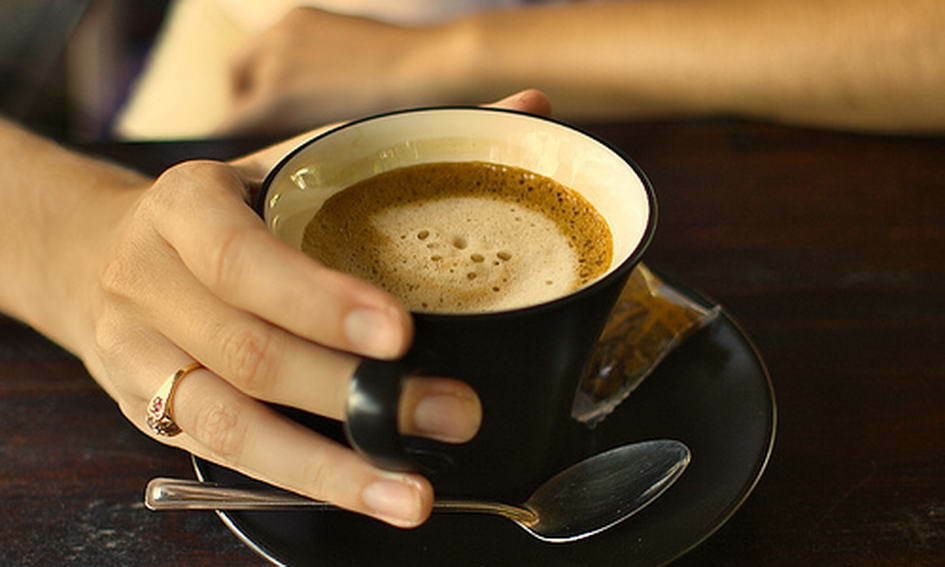 cup of coffee in hand
cup of coffee in hand At first glance, the ingredients present in coffee do not cause any harm to the body. But the recommendations to abandon this drink are still heard quite often. The following negative factors can explain this:
- Dependence of
Despite how many cups of coffee per day you drink, you get addicted to a certain dose of coffee, without which you already feel some discomfort. For this reason, and also because of the sense of pleasure that coffee causes, some try to attribute coffee to narcotic properties. However, the release of the hormone "happiness" of serotonin is also observed after eating chocolate. Obviously, attributing these products to drugs is an exaggeration. As for addiction, the unpleasant symptoms of irritability and headache that appear when the coffee is abruptly discontinued usually disappear quickly.
- Heart Disease
Coffee is often associated with a risk of developing heart disease, in particular coronary heart disease. There is no reliable information that coffee can cause coronary heart disease in a completely healthy person. However, people suffering from cardiovascular diseases, to drink coffee, as well as other caffeinated products, is dangerous to health.
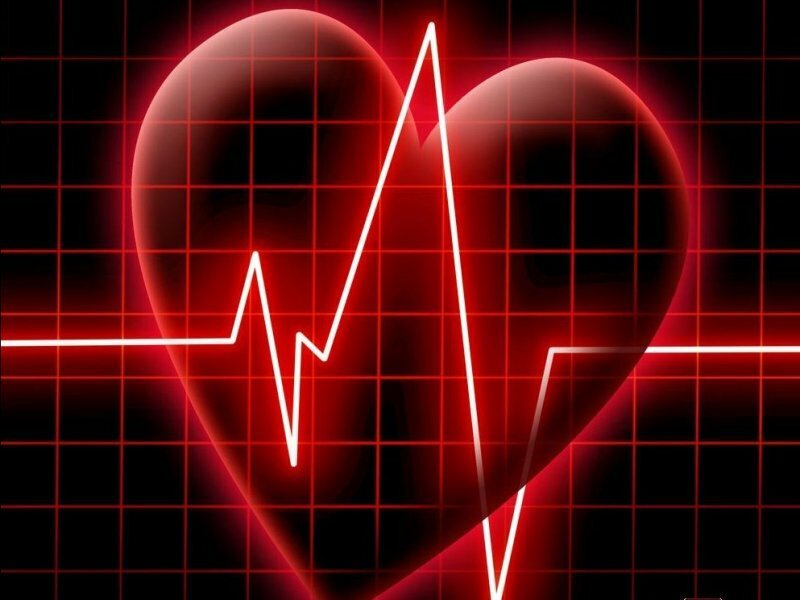 heart disease
heart disease - Increase in pressure
Coffee is really capable of raising blood pressure, but this effect is short-lived. In addition, the results of studies have recorded that in most cases, people who are unaccustomed to coffee react to pressure. Those who used coffee on a regular basis, the increase in pressure was either not observed at all, or was insignificant. Therefore, there is no direct relationship between coffee consumption and the development of hypertension. It should be noted that this is a reasonable amount of daily consumption of coffee( for more details, see below) and healthy people. It is obvious that hypertensive coffee is contraindicated.
- Calcium Non-Absorption
Coffee interferes with the full absorption of calcium. This is one of the reasons why coffee is not recommended to drink during pregnancy, when calcium is especially needed for the female body. In addition, it makes no sense to combine the intake of products that serve as a source of calcium, with coffee( curd, cheese, etc.), because calcium is simply not absorbed by the body.
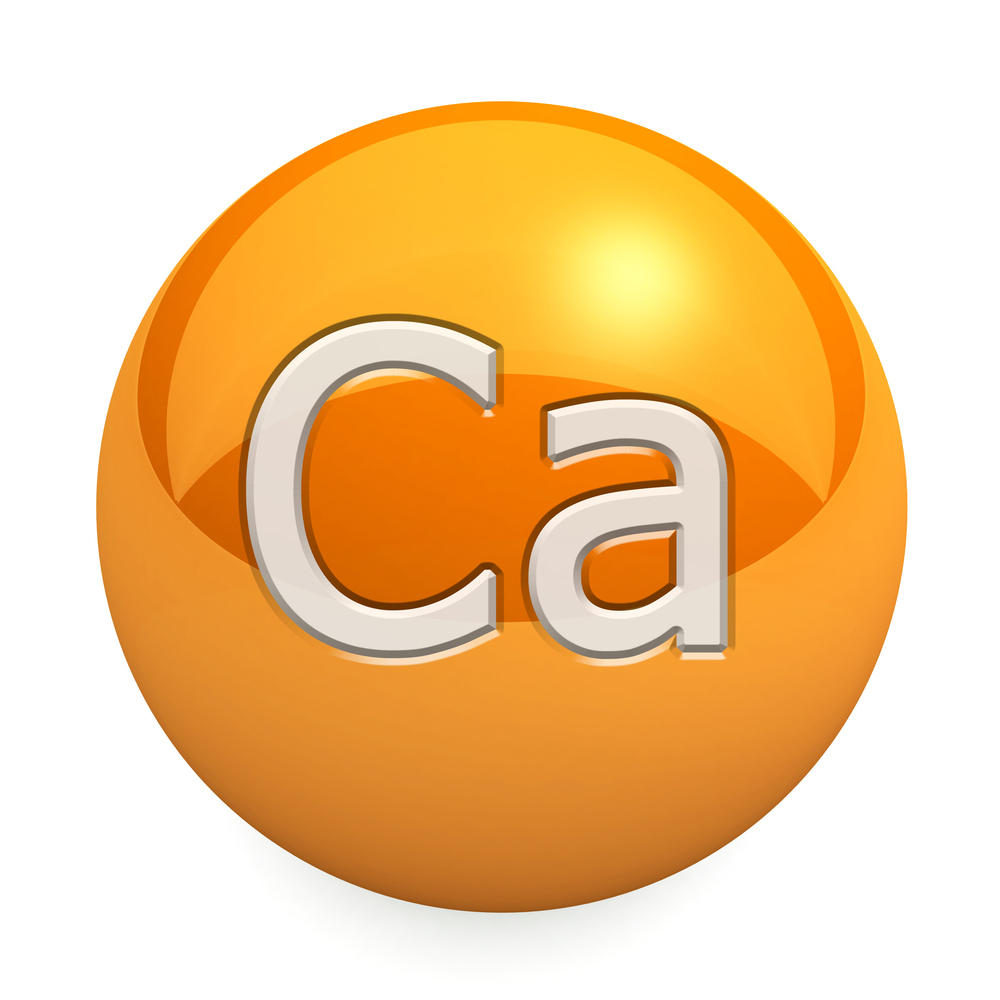 calcium
calcium - Nervousness and irritability of
These and more serious disorders of the nervous system can cause excessive consumption of caffeine. According to the study, drinking more than 15 cups of coffee a day can lead to hallucinations, nerves, convulsions, fever, heart rate, vomiting, stomach upset, etc.
It should also take into account the individual sensitivity to coffee. For someone 4 cups a day does not affect well-being, and someone after one feels nervous overexcitation.
- The formation of benign breast tumors
This conclusion was reached when investigating the effect of excessive doses of caffeine on the female body. This applies to all caffeinated products. There is evidence that a benign tumor disappears when caffeine consumption ceases.
- Dehydration
One of the drawbacks of coffee is dehydration, while a person does not always feel thirsty. Therefore, coffeemans should monitor the amount of liquid being drunk and remember the need for additional water intake.
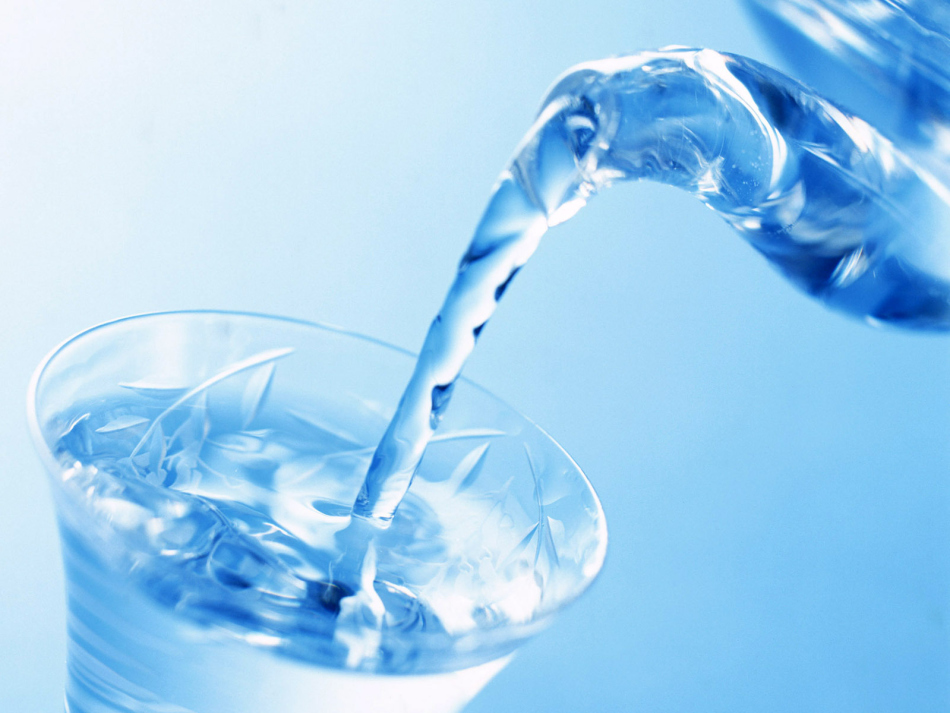 water
water - et al.
Coffee should not be used with:
- atherosclerosis
- insomnia
- hypertension and heart disease
- glaucoma
- increased excitability
- cholecystitis
- liver cirrhosis
- stomach diseases( ulcer, gastritis, etc.), kidney
- , etc.
Do not indulge in coffee before bedtime due to possible insomnia and increasedexcitability.
It is advisable to give up coffee or reduce its amount during pregnancy. Such a warning was first explained by the threat of miscarriage. Recent studies indicate that the abuse of caffeine affects the weight of the fetus, as well as the duration of pregnancy. Caffeine reduces the weight of the baby at birth and increases the gestation period.
 pregnant woman with a mug of coffee
pregnant woman with a mug of coffee In addition, it is not recommended to drink coffee for elderly people.
In general, it is advisable to talk about the dangers of coffee under the condition of substantial abuse, when buying low-quality, cheap coffee, as well as in case of violation of the rules for the preparation of this drink.
Benefit from drinking coffee
Reasonable consumption of caffeine not only does not harm, but also positively affects the work of the body. In particular, coffee:
- promotes brain mental activity
- tones up, improves mood, adds strength and energy
- eliminates headache, migraine
- saves from fatigue, lethargy, drowsiness
- is an antidepressant, reduces the likelihood of suicidal episodes
 the girl in the jump
the girl in the jump - stimulates memory andis the prevention of Parkinson's and Alzheimer's diseases
- weakens the effect of hypnotics, caffeine is used for intoxication with poisons and drugs
- stimulates the work of the stomach
- increases cardiac activity, increases blood pressure, which alleviates hypotension.
- has anticarcinogenic properties, reduces the risk of developing cancer.
- reduces the likelihood of cirrhosis, gout, diabetes, kidney problems.
It is important to emphasize that a positive effect with coffee consumption can be achieved only withmoderate consumption of this drink.
Daily intake of coffee
Without harm to health, you can afford 300-500 mg of caffeine per day. Depending on the degree of roasting and variety, one cup of coffee contains 80-120 mg of caffeine. This means that approximately you can drink 3-4 mugs a day, without worrying about the possible consequences.
 three cups of coffee
three cups of coffee The admissible daily dose of caffeine during pregnancy according to WHO is 200-300 mg, which is equivalent to 2-3 cups of coffee.
However, it should be remembered that coffee is not the only source of caffeine, so count the individual portion taking into account other caffeinated products that you consume.
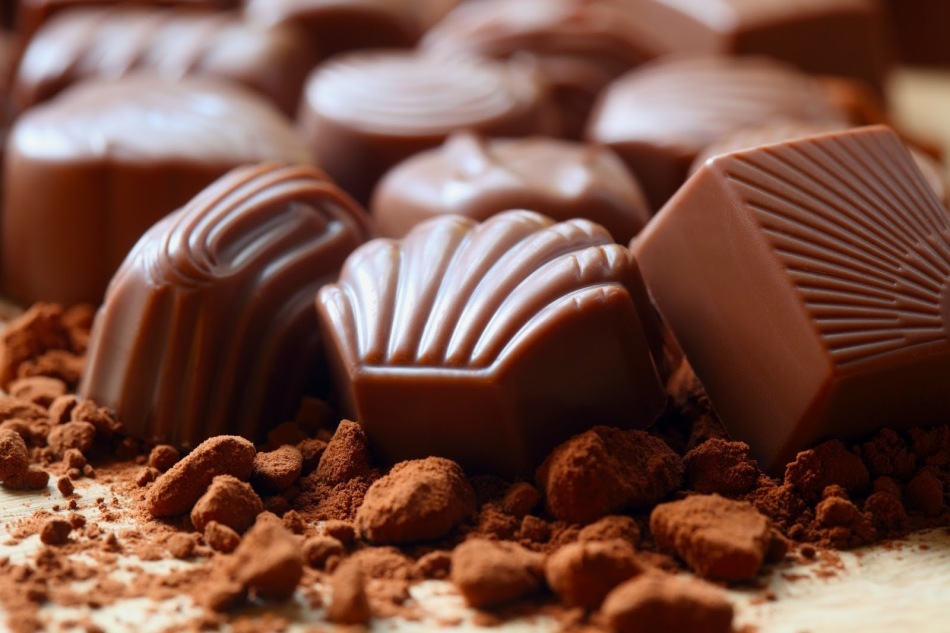 chocolate candies
chocolate candies Negative effects of coffee, some studies are fixed even with a regular excess of daily volume of 4-5 mugs.
A daily dose of 10 grams of caffeine is considered fatal, which corresponds to approximately 100 cups of coffee.INTERESTING: According to the amount of coffee consumed per capita, Finland ranks first, on the second - the USA, on the third - the United Kingdom and on the fourth place - Russia.
Kinds and varieties of coffee: Arabica and Robusta
There are two most popular types of coffee: Arabica and Robusta, while there are more than hundred varieties.
Arabica
- The most common type of coffee
- is characterized by a softer taste, light acidity and strong aroma
- contains about 18% of oils and 1-1.5% of caffeine
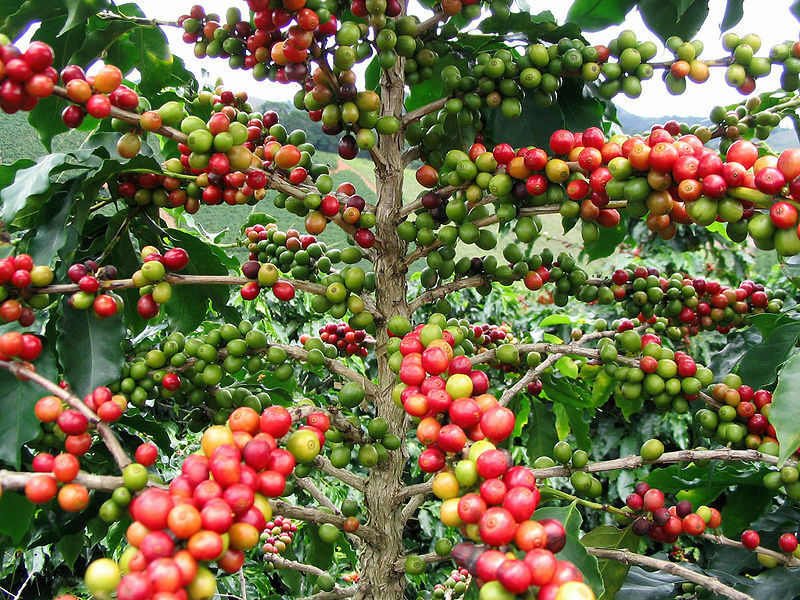 coffee tree arabica
coffee tree arabica Robusta
- is characterized by a rougher taste, astringent aftertaste
- contains about 9% of oils and up to 3% of caffeine
- is often used in the preparation of instant coffee
- is usually not consumed as a pure bitter taste, but mixed with Arabica in different proportions
- is inferior in popularityarabica because of the specific taste qualities of
- , the caffeine content in robusta twice exceeds that in arabica
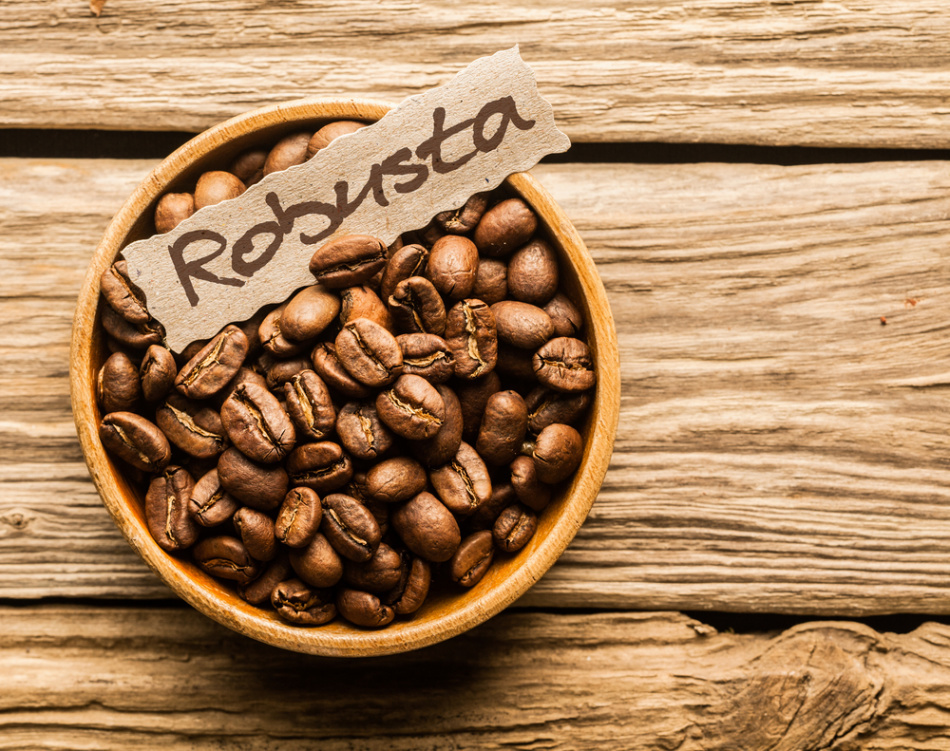 coffee beans robusta
coffee beans robusta In addition to these species, there are also coffee of a liberal and an excelsa, totorye similar in taste to Robusta and are used to create mixtures.
The taste, smell and chemical composition of coffee, including the amount of caffeine, is determined by the climate, the soil of the growth of coffee trees and other factors, the variety of which causes the presence of a large number of varieties of coffee.Some of them:
- Santos, Victoria, Conilon( Brazil)
- Colombia
- Ethiopian Arabica Harar
- Arabica Mysore( India)
- Tanchanchula, Maragozhip( Mexico)
- Manding, Lintong( Indonesia)
- Arabian Mokko( Yemen)
- Nicaragua Maragogue andother
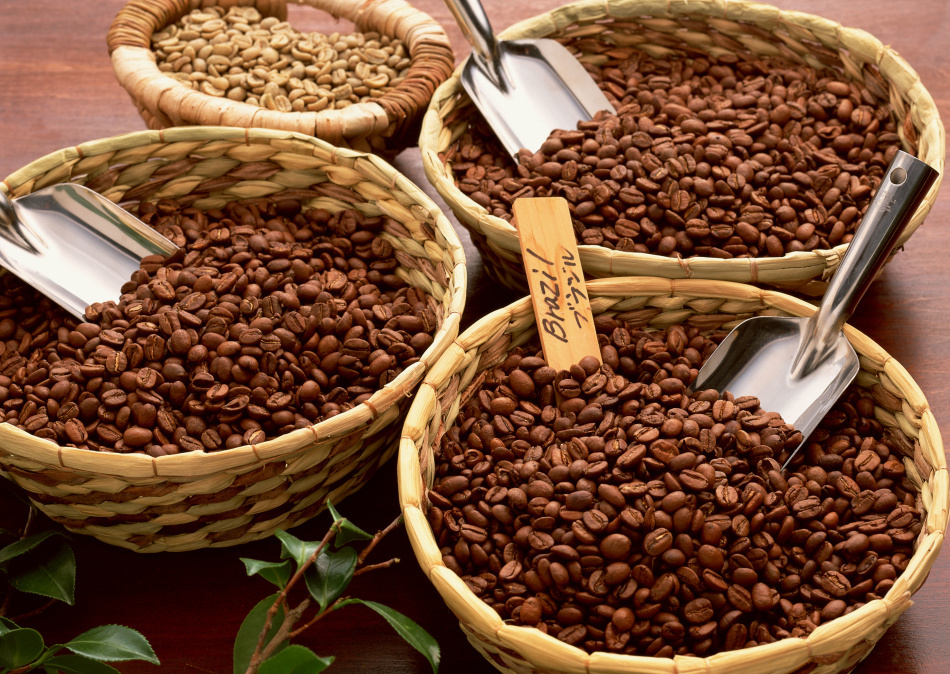 different types of coffee
different types of coffee What kind of coffee is coffee?
Depending on the method of preparation, the duration of the opening of the fragrance and taste qualities, different types of grinding are used. Allocate:
Rough
- Application: best suited for French press, piston or classic
- coffee makers. Time required for full taste: up to 8-9 minutes
Medium
- Application: the most versatile grinding, used in many different waysbrewing, good for carob coffee makers
- Time: up to 6 minutes
Slim
- Application: coffee preparation in the coffee maker
- Time: up to 4 minutes
IMPORTANT: For espresso there is a special type of grinding thatth is marked appropriately on the coffee package. Espresso coffee machines are immediately equipped with a special grinder for special grinding.
Very fine( powdery)
- Usage: ideal for cooking in turkey to produce so-called Turkish coffee
- Time: 1 minute
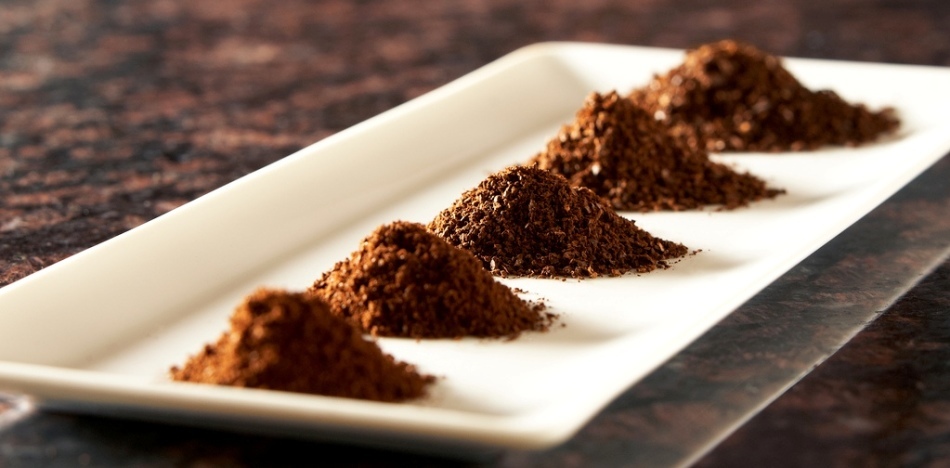 different grinding of coffee
different grinding of coffee Too thin grind can be bitter, if too coarse grinding coffee can turn watery, because with wrongpreparation will not have time to reveal its taste. In addition, ultra-thin along with very large grinding coffee can clog the coffee machine. Therefore, it is important to fine-tune grinding, to find the most suitable individual taste, depending on the type of preparation.
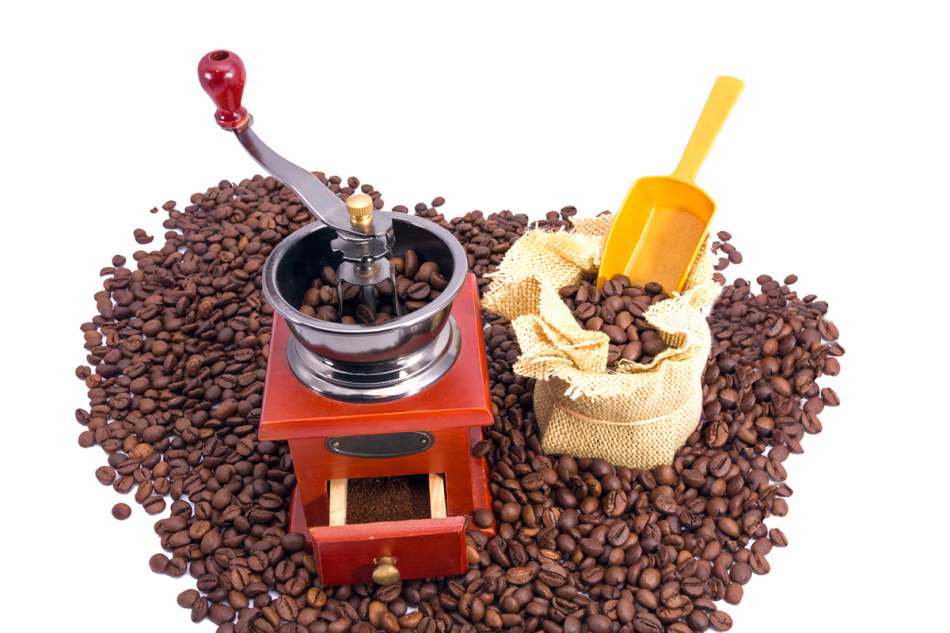 hand coffee grinder
hand coffee grinder You can grind coffee yourself using a grinder( manual or electric) or you can buy the right grinding, obtained by industrial means. The latter usually undergoes additional filtration( via a special screen) to select coffee particles of the same size. It is known that homogeneous coffee better manifests its taste properties.
How much can you store ground coffee?
It is recommended to grind coffee just before consumption, otherwise the coffee left in the coffee grinder loses its aroma in an hour.
Coffee is very sensitive to air and light. Therefore, it should be stored in a sealed package in a cool place.
 bank for storage of coffee
bank for storage of coffee After opening the package, ground coffee loses its original flavor and taste after a week. Accordingly, for maximum preservation of taste qualities, ground coffee should be in a vacuum.
The most popular coffee drinks
Combining many different ingredients with coffee in various proportions, you get a large assortment of coffee drinks. Ice cream, caramel, milk, chocolate, liquor, honey, berry syrups, etc. Is an incomplete list of coffee-compatible products that give it a unique taste and smell.
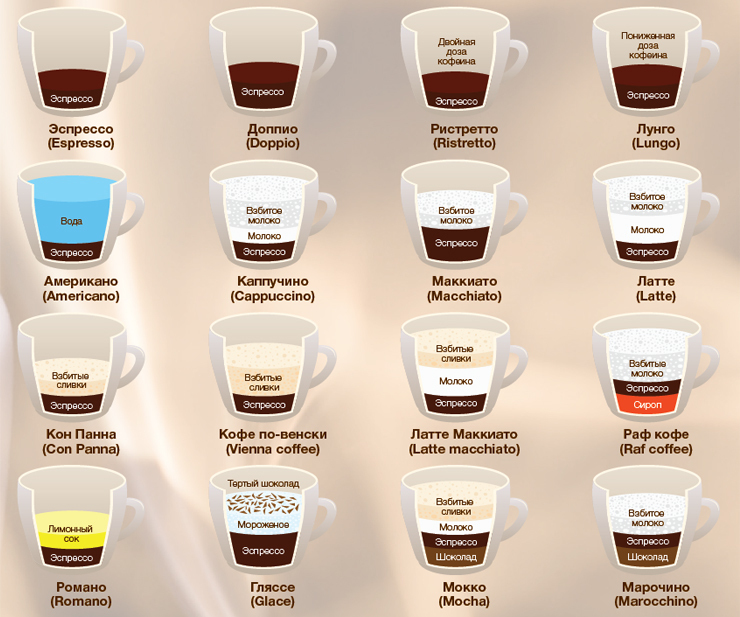 types of coffee drinks
types of coffee drinks Among the most common coffee drinks:
- espresso - pure coffee, which is prepared in small volumes with a high concentration of coffee, which makes the drink very strong;
- American is an espresso with a high water content for those who do not like the bitterness of a strong espresso
- Cappuccino - coffee with the addition of milk and the formation of milk foam
- macchiato - cappuchino subspecies: coffee + milk foamin the same proportions
- latte - milk with coffee, where a large share of the drink is taken by milk
- glossy - coffee with ice cream
- ayrish - coffee with alcohol
- mocha - lwith
- - espresso with whipped cream, sprinkled with chocolate, cinnamon, nutmeg, etc.
- novel - espresso with lemon zest
- Turkish coffee - with foam with spices( cinnamon, cardamometc.), classic coffee brewed in the Turkish
- and many others
Is it beneficial or harmful to have coffee with milk?
 coffee with milk
coffee with milk Milk inhibits the effect of caffeine, so coffee with milk has a less toning effect. For people suffering from gastritis or other diseases in which it is not recommended to get involved in caffeine, coffee with milk
in limited quantities can be an excellent way out.IMPORTANT: In pure form, the coffee does not contain calories, but with the addition of milk, it loses its properties of a dietary product.
Is it useful or harmful to coffee with lemon?
 coffee with lemon
coffee with lemon Vitamin C-rich lemon is undoubtedly a useful product. In addition, the lemon also neutralizes the effect of caffeine. In combination with lemon coffee drink acquires a special taste and is perfect for those who love coffee, but is afraid of excessive exposure to caffeine.
Is it useful or harmful to have coffee with cinnamon?
 cup of coffee with cinnamon
cup of coffee with cinnamon Cinnamon is known for its numerous healing properties and wide application for weight loss. Therefore, coffee with cinnamon( without sugar) can become not only a tasty drink, but will also contribute to weight loss( provided that other necessary conditions are met).
However, cinnamon, especially in large quantities, has a number of contraindications:- pregnancy, hypertension, liver and kidney problems, increased excitability, individual intolerance, etc.
Is it good or bad for decaffeinated coffee?
At first glance, decaffeinated coffee solves all the problems associated with the negative consequences of excessive caffeine consumption. However, everything is not so simple.
 girl with a cup of coffee
girl with a cup of coffee - First, caffeine in this coffee is still contained, but in small quantities.
- Secondly, the decaffeination process in the vast majority of cases involves the processing of grains with a chemical solvent, ethyl acetate, which, despite subsequent cleaning with boiling water, risks remaining on the coffee beans.
- Third, is one of the negative consequences of consuming decaffeinated coffee is the increase in the amount of free fatty acids in the blood that are responsible for the formation of bad cholesterol.
In addition, caffeine, as mentioned, has, with the right approach, a positive effect on the body.
IMPORTANT: According to the results of the investigation, the charge of caffeine in raising the pressure is unreasonable. Perhaps it is the fault of other components of coffee.
Therefore, consuming decaffeinated coffee is not always a reasonable substitute.
How to prepare coffee?
 coffee in turkey
coffee in turkey The final properties of coffee, including its benefits or harm, depend on the method and the correctness of the preparation.
In order to make good coffee at home in the absence of a special coffee machine, it is necessary:
- to fill the coffee turd with
IMPORTANT: It is better to give preference to the finest coffee grind.
- pour cold water
- wait until the foam rises and remove
- from the fire, allow it to stand for a while, and repeat the procedure two more times
- before pouring the cups over the cups, the latter should be heated with boiling water.
IMPORTANT: The coffee can not be brought to boiling.
To prepare coffee in Turkish use 10 g( 3 tsp) for one glass of water, but the dosage can be changed based on preferences.
Useful tips for the hostess
 a cup of coffee and coffee beans in the smoke
a cup of coffee and coffee beans in the smoke - In order to check the quality of the coffee beans, you can pour them with cold water, shake a little and drain the water. If the color of the water has not changed, it means that the coffee is of high quality, i.e.does not contain dyes
- The test for impurities in the ground coffee can be done in a similar way: pour cool water. If impurities are present, they will settle, and you will notice them on the bottom of the container.
To summarize, let's list 10 basic facts of that you need to know about coffee:
1. With moderate consumption( no more than 3-4 cups per day), coffee does not harm a healthy person
2. Moreover, coffee hasa number of useful properties, including stimulates brain activity, suppresses depression, prevents the development of many diseases.
3. Contraindications to coffee use exist in the presence of problems with the heart, nervous system and other diseases of the liver, kidneys, etc.
4. Arabica contains half as much caffeine as robusta
girl and boyfriend for a cup of coffee
5. Grinding coffee is important for different ways of making coffee. For example, the smallest is used to make coffee in a Turkish and takes less time to disclose its palatability than the larger grind
6. The amount of caffeine increases during heat treatment, i.e.dark roasted grains contain less caffeine than slightly fried
7. Instant coffee is made from cheaper and less valuable coffee varieties and contains more caffeine coffee cup with haze
coffee cup with haze 8. It is preferable to buy coffee beans and grind it before cooking, asground coffee quickly loses its flavor and initial taste characteristics, and it is impossible to store it for a long time in the absence of vacuum packing.
9. Decaffeinated coffee can be used in certain ways of decaffeinationTo be even harmful
10. Coffee is recommended to drink in the morning, but not on an empty stomach, as it stimulates digestion.Video: Coffee. Harm and benefit of
Video: Scientific news about the benefits of coffee
